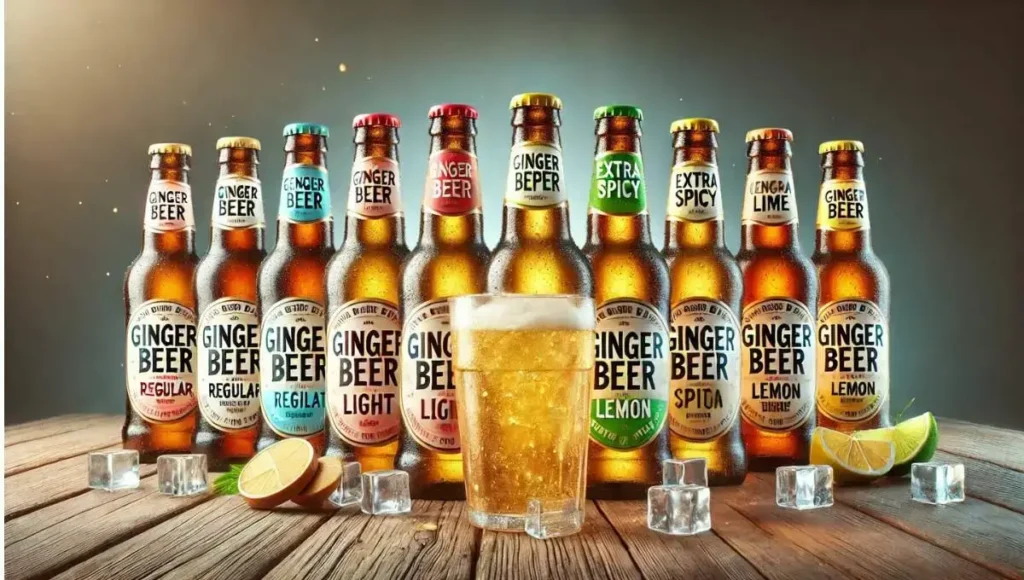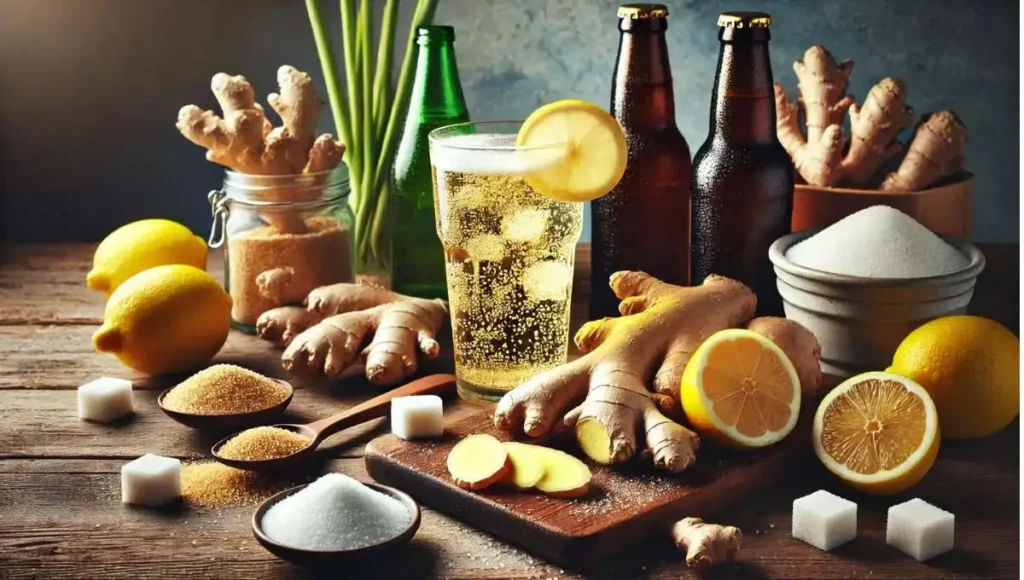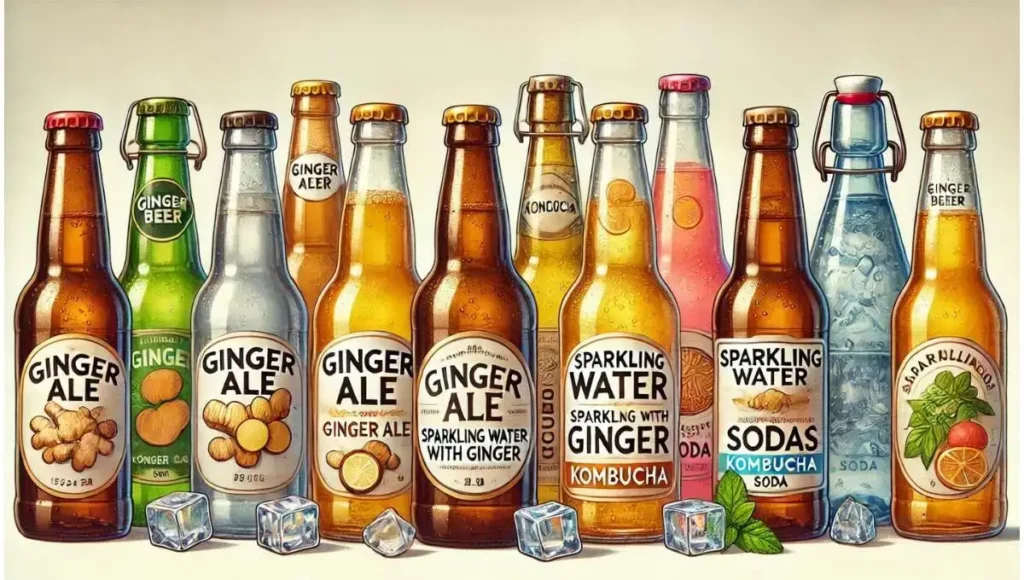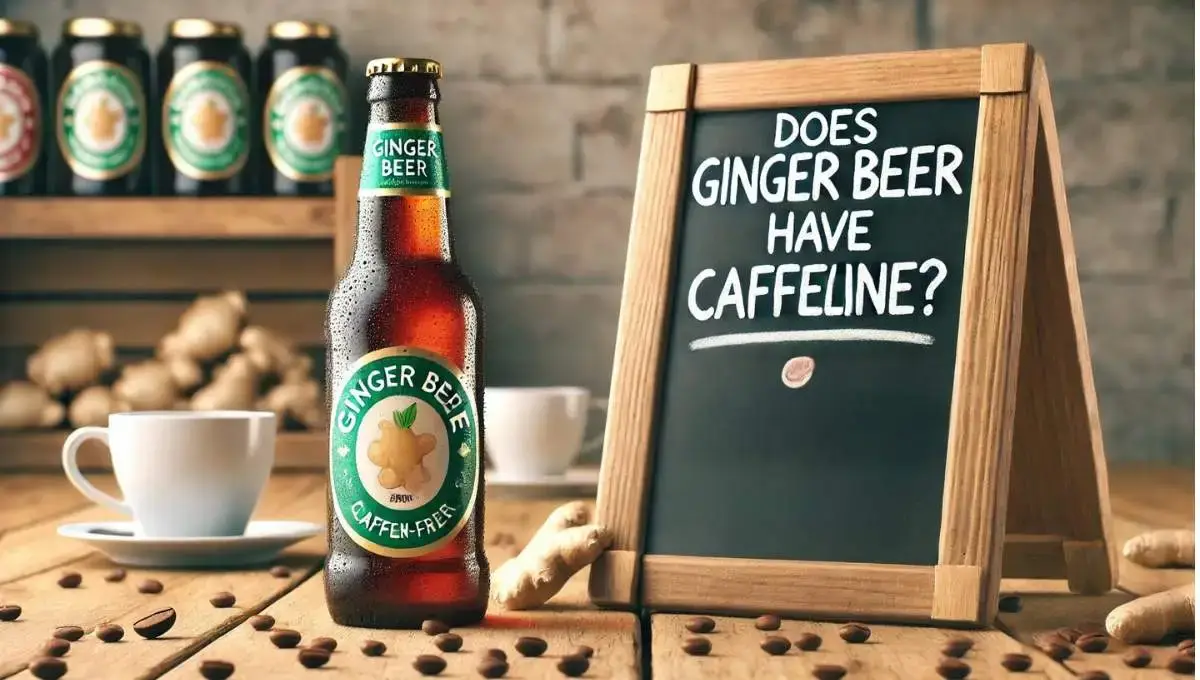If you’ve ever tried ginger beer, you know it’s a fizzy drink with a unique flavor that many find refreshing. Unlike traditional beer, ginger beer is completely non-alcoholic, making it a great choice for people of all ages. However, there is a common misunderstanding about whether ginger beer contains caffeine. Many people wonder if it will give them that same energy boost they get from coffee.
The good news is that most ginger beers are made from simple ingredients like ginger, sugar, water, citric acid, and lemon juice, and are typically caffeine-free. While other carbonated drinks like ginger ale or cola might contain caffeine, ginger beer is generally processed without any added stimulants.
If you’re looking for a refreshing drink without the stimulant effects of caffeine, ginger beer is a great option, just be sure to check the labels to confirm the caffeine presence in different variants.
Understanding the Caffeine Content in Ginger Beer
Ginger beer has earned global popularity for its versatility, often enjoyed straight up, in a classic cocktail, or with a creative twist. It’s a ginger-based beverage that offers a refreshing and flavorful experience that appeals to people around the world.
While many enjoy it as a sweet treat, it’s also important to note the potential health benefits it can offer, thanks to its primary ingredient: ginger. Ginger has long been used for its digestive benefits, and it contains compounds like gingerols and shogaols that are believed to soothe nausea, improve digestion, and even reduce inflammation.
Fun Facts About Ginger Beer!
Despite its many benefits, one of the most common misconceptions about ginger beer is that it contains caffeine. This confusion likely arises because the word “beer” is often associated with caffeine content, but traditional ginger beer is typically caffeine-free. Some modern variations of ginger beer do include caffeine as an added ingredient, making it essential to check the ingredients list for this distinction.
Historically, ginger beer was a fermented beverage with low alcohol content and no caffeine. However, modern commercial ginger beers can differ significantly from their traditional roots, so it’s important to understand the differences when choosing the right ginger beer.
Does Ginger Beer Have Caffeine? Key Insights
No, most commercially produced ginger beers do not contain caffeine.
The term “beer” in ginger beer refers to the traditional fermentation process, not the presence of alcohol or caffeine. While some artisanal or homemade versions might have negligible, trace amounts of caffeine due to naturally occurring compounds in ginger root, this is not typical of widely available commercial products.
Ginger beer is primarily made from ginger, sugar, water, and yeast. Its distinctive spicy flavor comes from the ginger, and it is a popular beverage often enjoyed as a refreshing soft drink or a mixer in cocktails. Unlike traditional sodas that may contain added caffeine, ginger beer’s composition naturally excludes this stimulant.
However, it’s important to stay mindful that some modern twists on the classic recipe may purposefully add caffeine for an energy boost, which is becoming more common in some newer brands. These variations are different from the traditional version, so it’s important to differentiate them.
In contrast, ginger ale is a milder drink that’s often used in cocktails with caffeinated ingredients like cola. This association can lead to the misconception that ginger beer, its bolder cousin, might also contain caffeine. In reality, the only time caffeine might be added to ginger beer is during the manufacturing process to create a more stimulating version.
Popular ingredients used for this include guarana, green tea extract, kola nut extract, and yerba mate, which are all natural sources of caffeine.
These plants provide energy boosts in varying strengths, with guarana offering a much stronger energy impact than green tea extract or yerba mate. So, while most ginger beers remain caffeine-free, it’s essential to check the label for any of these additions if you’re looking for a caffeine-free experience.
Ginger Beer Variants: Do They All Contain Caffeine?

Ginger beer comes in a wide range of varieties, each offering a unique blend of flavors and attributes designed to appeal to different palates. This versatility has made ginger beer a popular choice for many, as it is available in several options to suit different taste preferences, whether you prefer something sweet, spicy, or mild. While some distinct flavors are tailored to specific tastes and experiences, not all ginger beer variants are the same.
The caffeine content can vary greatly depending on the brand, with some adding caffeine for a more stimulating experience while others remain caffeine-free. The brewing process and ingredients used can also play a role in whether a ginger beer contains caffeine.
As ginger beer continues to grow in popularity, new brands and variants are emerging, each offering something unique, and it’s essential to check the label to see whether it’s the classic ginger flavor you love or a more energizing version that might include caffeine.
Extra Spicy Ginger Beer: Is It Caffeinated?
If you love bold flavor and enjoy the intense heat of spicy drinks, then extra spicy ginger beer is a popular choice for you. These varieties are crafted with higher amounts of ginger and often include additional spices, resulting in a pronounced spicy sensation that adds extra kick.
While extra spicy ginger beer is certainly known for its bold taste, it’s important to note that it generally remains caffeine-free. Unlike drinks that rely on caffeine for an energy boost, extra spicy ginger beer gets its punch from the natural spices and ginger, making it a flavorful yet caffeine-free option.
Light or Diet Ginger Beer: Does It Have Caffeine?
Light or diet ginger beer is typically formulated to contain fewer calories and less sugar than its traditional counterparts, making it a healthier alternative for those looking to cut down on sugar. These drinks maintain the familiar ginger flavor without the high sugar content.
Most light or diet ginger beers are caffeine-free, so they provide a refreshing beverage without the stimulating effects of caffeine. However, some versions may use artificial sweeteners to achieve the sweet taste without adding sugar, so it’s always a good idea to check the ingredients for any specific details.
Some variations may contain trace amounts of caffeine or other ingredients that could impact the overall caffeine content, so it’s essential to keep an eye on labels when choosing the right option.
Flavored Ginger Beer: Caffeine Content Explained
Flavored ginger beer variants offer unique taste experiences with options like lemon, lime, raspberry, and mango, giving a refreshing twist to the classic ginger taste. These drinks are commonly appreciated for their bold, unique flavors, and the majority are free from caffeine.
However, it’s always good to check the label, as some fruit-infused versions like apple might have added caffeine, depending on the brewing process. While many of these drinks don’t contain caffeine, it’s always essential to make sure you’re enjoying a caffeine-free beverage, especially if caffeine has been specifically added as an ingredient in certain variants.
Craft or Artisanal Ginger Beer: Is It Free of Caffeine?
Craft or artisanal ginger beer variants are often made using traditional brewing methods and high-quality ingredients to create small-batch offerings. These drinks feature complex flavor profiles and artisanal touches that attract discerning ginger beer enthusiasts.
While these beverages are known for their unique, flavorful drinks, they are generally caffeine-free, offering a refreshing experience without the stimulating effects of caffeine. However, it’s important to note that some craft ginger beers may contain specialty ingredients like herbs or teas that could influence the overall caffeine content.
Always check the label for specific details, especially if the brand adds caffeine for a more energizing version.
Alcoholic Ginger Beer: Caffeine Levels vs. Alcohol Content
Alcoholic ginger beer typically contains alcohol derived from the fermentation process. While caffeine is generally not part of the equation, some alcoholic beverages may include it, especially when mixed with caffeinated ingredients like coffee. Most hard ginger beers, however, contain alcohol and are designed for those who want a kick from the mild alcoholic content, similar to beer or cider.
f you’re looking for a caffeine boost, it’s important to check the label to confirm whether caffeine has been added. Alcoholic ginger beer is usually more about the alcohol content, but there are exceptions where caffeine might also be present.
Organic or Natural Ginger Beer: Does It Contain Caffeine?
Organic or natural ginger beer is made using organic ingredients and natural ingredients, with a strong focus on purity and sustainability. These options are perfect for consumers who want a cleaner, more wholesome beverage choice.
Most organic varieties are generally caffeine-free, making them a great option for those who want to avoid caffeine. However, it’s always a good idea to check the label for potential exceptions.
While most ginger beer varieties follow this caffeine-free trend, some may contain small amounts of caffeine if it is specifically added as part of the recipe. If you’re uncertain, it’s always a good idea to check the caffeine content.
Common Ingredients in Ginger Beer: What to Look For

The ingredients in ginger beer are critical in determining whether it contains caffeine. The primary ingredients of ginger beer include:
Ginger: The Key Ingredient
The main ingredient in ginger beer, ginger, provides the distinctive warmth and kick that make the drink so popular. It contributes to the fiery and fragrant flavor that defines ginger beer.
Carbonated Water: Adding Refreshment
Most ginger beers contain carbonated water, which gives the drink a bubbly effervescence and enhances its refreshing qualities, making it a perfect thirst-quencher.
Sugar: Balancing the Spiciness
To balance the spiciness of ginger, sugar is often added to create a harmonious flavor profile. This sweetness helps tone down the heat from the ginger while maintaining the drink’s refreshing taste.
Lemon Juice: Brightening the Flavor
Lemon juice is sometimes included in ginger beer recipes. It adds brightness and a touch of acidity, which enhances the overall flavor and complements the ginger.
Flavorings and Spices: Extra Complexity
Some ginger beers include spices like cinnamon and cloves or fruit extracts to add extra complexity to the drink, offering a richer, more layered taste experience.
Yeast and Natural Carbonation
Depending on the brewing method, yeast may be used in ginger beer for natural carbonation, giving the drink a slightly tangy flavor. This can add to the depth of the overall taste.
Caffeine: What to Watch For
If you’re seeking a caffeine-free option, be sure to check the label for any energy-boosting additives like tea or coffee extract, which could indicate the presence of caffeine in the drink.
Ginger Beer Nutritional Information: What You Should Know
A typical serving of ginger beer (about one can, or 382 grams) contains approximately 186 calories. It’s fat-free, with 0 grams of total fat, including saturated, polyunsaturated, and monounsaturated fat. It also doesn’t contain any cholesterol. However, it does pack a good amount of carbohydrates, with 48 grams per serving, all of which are in the form of sugar.
There’s no dietary fiber or protein in it. When it comes to micronutrients, it offers a small amount of calcium (11mg) and iron (0.7mg). It contains only a small amount of sodium (26mg) and potassium (4mg). Finally, traditional ginger beer is caffeine-free, so you can enjoy it without worrying about an extra energy boost.
| Nutrient | Typical Value | Unit |
| Calories (per 100ml) | 40-93 | kcal |
| Total Fat (g) | 0 | g |
| Sodium (mg) | 10-May | mg |
| Total Carbohydrates (g) | 25-Sep | g |
| Sugars (g) | 25-Aug | g |
| Dietary Fiber (g) | 0 | g |
| Protein (g) | 0 | g |
| Caffeine (mg) | 0 | mg |
| Calcium (mg) | 0-20 | mg |
| Iron (mg) | 0.1 | mg |
Caffeine Alternatives to Ginger Beer: What Are Your Options?

If you’re seeking alternatives to ginger beer that don’t include caffeine, there are plenty of options to consider. Whether you’re looking for something with a refreshing experience or a distinct flavor, there are many beverages that offer the variety and taste you enjoy, without the stimulating effects of caffeine.
You can try other drinks with ginger as the main ingredient, or even explore new choices that give you the same taste experience. These alternatives are becoming more popular, and they allow you to enjoy a caffeine-free beverage while still indulging in something flavorful and enjoyable.
Ginger Ale vs. Ginger Beer: Which Has Caffeine?
When it comes to ginger ale and ginger beer, they may seem similar due to their names, but they have different characteristics, especially when it comes to caffeine content. Ginger ale is typically milder and sweeter than ginger beer, with a lighter ginger flavor that makes it a popular choice for those who enjoy a gentler taste.
It can be consumed on its own or used as a mixer in cocktails. However, some brands of ginger ale may contain caffeine, so it’s important to check the label for details. In contrast, ginger beer tends to be spicier and is typically caffeine-free, making it an ideal option for those seeking a bolder flavor without the stimulating effects of caffeine.
Sparkling Water with Ginger: A Caffeine-Free Alternative
For a lighter and refreshing option, sparkling water with ginger flavoring provides a hint of ginger without the sweetness or intensity of ginger beer. This caffeine-free, low-calorie beverage is ideal for those seeking a flavorful and refreshing experience without the strong taste of ginger beer.
It offers carbonation without added sugar or calories, making it a healthier alternative for those watching sugar intake. While it lacks the intensity of ginger beer, it still delivers a satisfying taste of ginger, offering a refreshing twist on a classic favorite.
Ginger Kombucha: Is It a Caffeinated Choice?
Ginger kombucha is a tasty, mildly fizzy beverage that combines the tart taste and probiotic qualities of kombucha with the spicy zing of ginger. This fermented tea beverage offers the tanginess of kombucha with a unique twist, making it a popular option for those looking for something flavorful and refreshing.
While ginger kombucha does contain tea, it’s important to note that not all kombucha has a high caffeine content. This makes ginger kombucha a better option for those looking for a low-caffeine drink, as it generally contains less caffeine than traditional caffeinated beverages.
Ginger Tea: Comparing Caffeine Content
Ginger tea is a calming, caffeine-free substitute for ginger beer. It is made by steeping fresh ginger root in hot water, creating a cozy, warm beverage that is both soothing and packed with the health advantages of ginger.
While ginger tea is typically zero caffeine, it’s important to note that when blended with black tea or green tea, it may contain natural caffeine. To ensure you’re getting a caffeine-free drink, always check the specific tea label for caffeine content.
Ginger Shots: Are They Caffeinated?
Ginger shots are concentrated doses of ginger juice or extract, often mixed with other ingredients like lemon juice or apple cider vinegar. These potent shots offer a quick and convenient way to enjoy the health benefits of ginger, without the added sugars or carbonation found in ginger beer.
Unlike ginger beer, they are typically caffeine-free, making them an effective option for those seeking a natural boost of ginger’s goodness. While some health-conscious brands may add ingredients like turmeric for additional health benefits, most ginger shots remain a caffeine-free choice, providing a healthy and refreshing alternative.
Ginger Infused Cocktails: Caffeine in Your Cocktail?
Ginger-infused cocktails are a versatile and flavorful option for those seeking a refreshing twist on classic drinks like the Moscow Mule, Dark ‘n’ Stormy, or Ginger Mojito. These cocktails incorporate fresh ginger or ginger syrup, adding a spicy kick to your drink.
While some ginger-infused cocktails may include energy drink ingredients or coffee, which could contain caffeine, many traditional ginger beer-based cocktails, like the Moscow Mule, are typically caffeine-free, making them a great option for those who want to enjoy a refreshing cocktail without the caffeine boost.
| Beverage Type | Caffeine Content |
| Ginger Infused Cocktails | Varies depending on ingredients |
| Sparkling Water with Ginger | Caffeine-free |
| Ginger Ale | Typically caffeine-free |
| Ginger Shots | Caffeine-free |
| Ginger Tea | Caffeine-free |
| Ginger Kombucha | Varies (typically low) |
How Caffeine in Ginger Beer Affects Your Health
For most people, ginger beer is a safe, non-caffeinated drink that provides the benefits of ginger, including anti-inflammatory properties. However, for those who are sensitive to caffeine, it’s important to stick with traditional ginger beer and avoid brands that mix caffeinated ingredients.
Pregnant women, children, and individuals with caffeine sensitivities or sleep disorders should exercise caution when consuming ginger beer.
If you fall into these categories, it’s best to choose caffeine-free options or consult a physician to determine safe intake levels of caffeine.
Being aware of the caffeine content in the specific ginger beer you choose can help you make informed dietary decisions. It empowers you to align your beverage choice with your health needs and preferences, ensuring that it’s not only enjoyable but also suitable for your body’s requirements.
Regular Daily Intake of Ginger Beer
The regular daily intake of ginger beer depends on several factors, including individual health needs, the specific product’s ingredients, and overall dietary goals. Here are a few things to consider when determining an appropriate intake:
Sugar Content
Ginger beer usually has a high sugar content. A regular serving (about 8 oz or 240 ml) can have anywhere from 20 to 25 grams of sugar, which is close to or exceeds the daily recommended sugar intake for some individuals. The American Heart Association advises reducing the consumption of added sugars to:
- 25 grams per day for women
- 36 grams per day for men
For those watching their sugar intake (e.g., people with diabetes or those aiming for weight management), consuming ginger beer in moderation is key.
Calories
Ginger beer usually contains between 40 to 93 calories per 100ml depending on the brand and whether it’s a regular, diet, or light version. Consuming too many calories from sugary beverages can contribute to weight gain. Therefore, limiting intake to one or two servings per day can be a good guideline, especially if you’re also consuming other high-calorie drinks.
Carbonation and Digestion
Ginger beer is carbonated, which means it can cause bloating or discomfort in some people if consumed in excess. If you have digestive issues or acid reflux, it’s advisable to limit your intake to avoid aggravating symptoms.
Health Benefits of Ginger
Ginger, the primary ingredient in ginger beer, has many health benefits, including anti-inflammatory properties and aiding in digestion. However, these benefits may be reduced in ginger beer if the ginger concentration is low and the sugar content is high. Therefore, if your goal is to benefit from ginger, you might want to choose products with a higher ginger concentration or opt for fresh ginger tea.
Moderation
For most healthy individuals, consuming one 8 oz (240 ml) serving of ginger beer per day should be safe. It’s best to consume it as a treat rather than a daily staple, especially if it’s the regular, high-sugar variety.
Conclusion
If you’re looking for a refreshing, caffeine-free drink, ginger beer is an excellent choice. Unlike coffee or energy drinks that may cause jitters and a crash, the natural warmth of ginger offers a gentle lift, perfect for a midday pick-me-up. Its bold ginger flavor provides a delightful zing that awakens your taste buds and leaves you feeling refreshed.
The next time you need a boost, reach for a chilled bottle of ginger beer and enjoy the invigorating, caffeine-free zest it brings, offering a unique and satisfying experience.
FAQs
Does ginger beer give you energy?
Ginger is not typically known to make you feel sleepy; in fact, it is more often commonly associated with providing an energy boost and having a stimulating effect on the body. It is also used to alleviate symptoms like fatigue, nausea, and dizziness, helping you feel more energized and refreshed.
Are all ginger ale caffeine-free?
Most ginger ale products are caffeine-free, though a few brands, such as Bawls, do contain caffeine. The odds of finding caffeinated ginger ale in your supermarket are low, so it’s more common to find non-caffeinated ginger ale.
Is ginger beer healthier than coke?
The average glass of ginger beer contains a whopping 38.5g of sugar, which is the equivalent of just over eight teaspoons, according to research by the British Medical Journal (BMJ Open). In comparison, a glass of Coke contains 35g of sugar, which is about seven teaspoons. This shows that ginger beer has a slightly higher sugar content than Coke.
Why is ginger beer so strong?
Ginger beer is more intense and has a bolder ginger flavor compared to ginger ale. This is due to the fact that ginger beer is brewed using real ginger root, whereas ginger ale is usually made with ginger flavoring or extract, resulting in a milder taste. The use of real ginger root in ginger beer contributes to its stronger and more distinct flavor.

